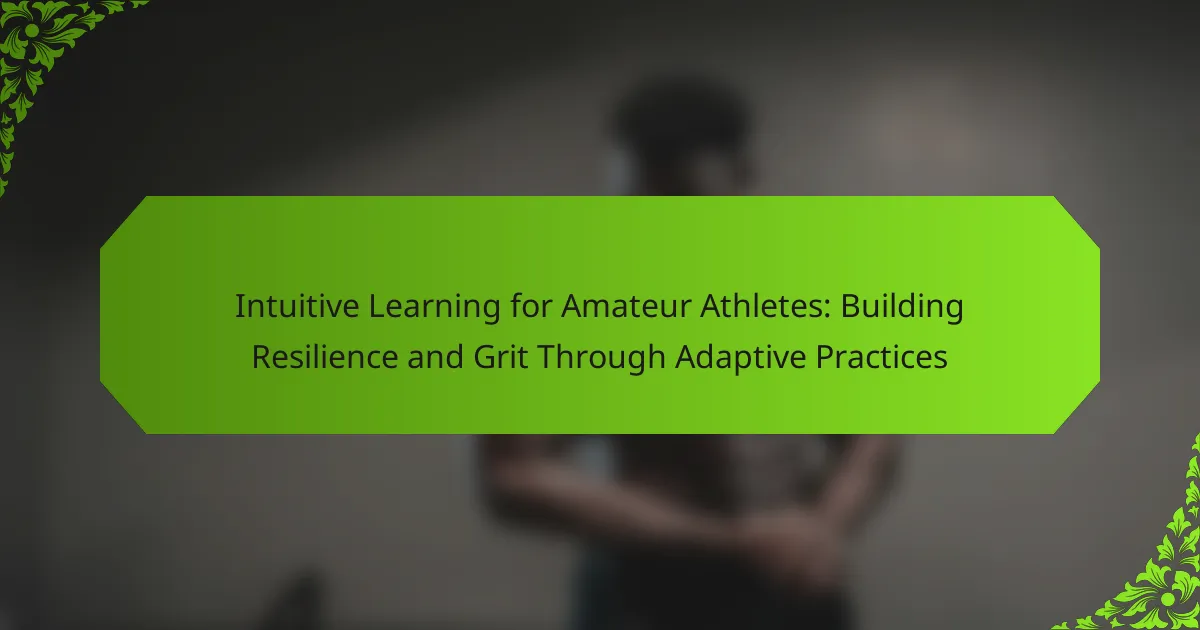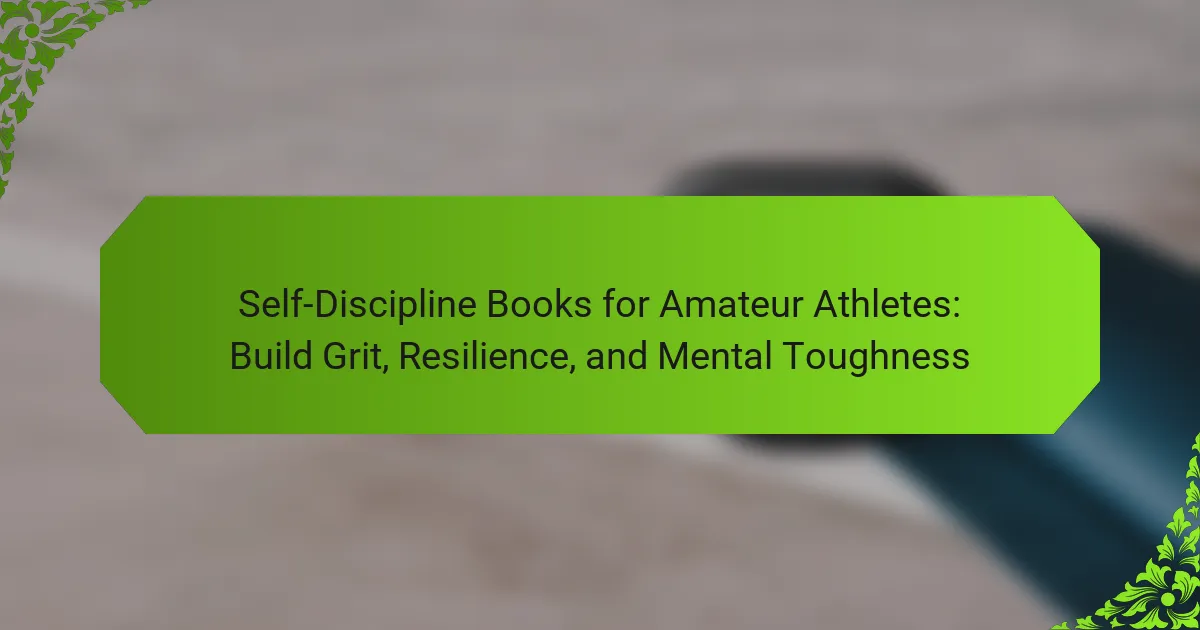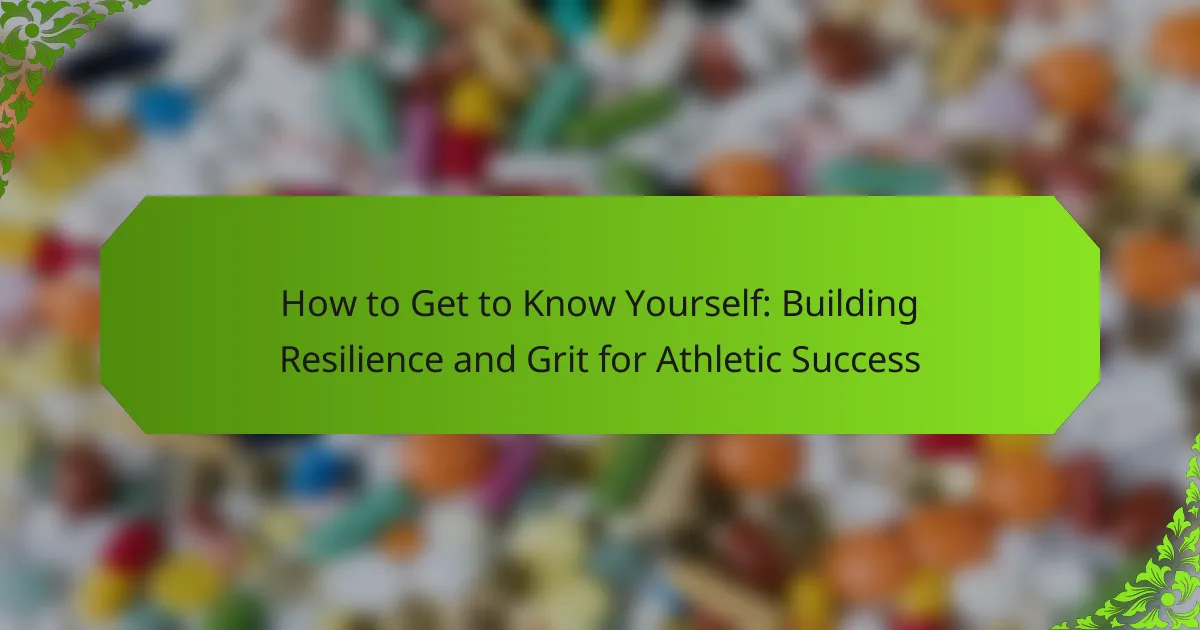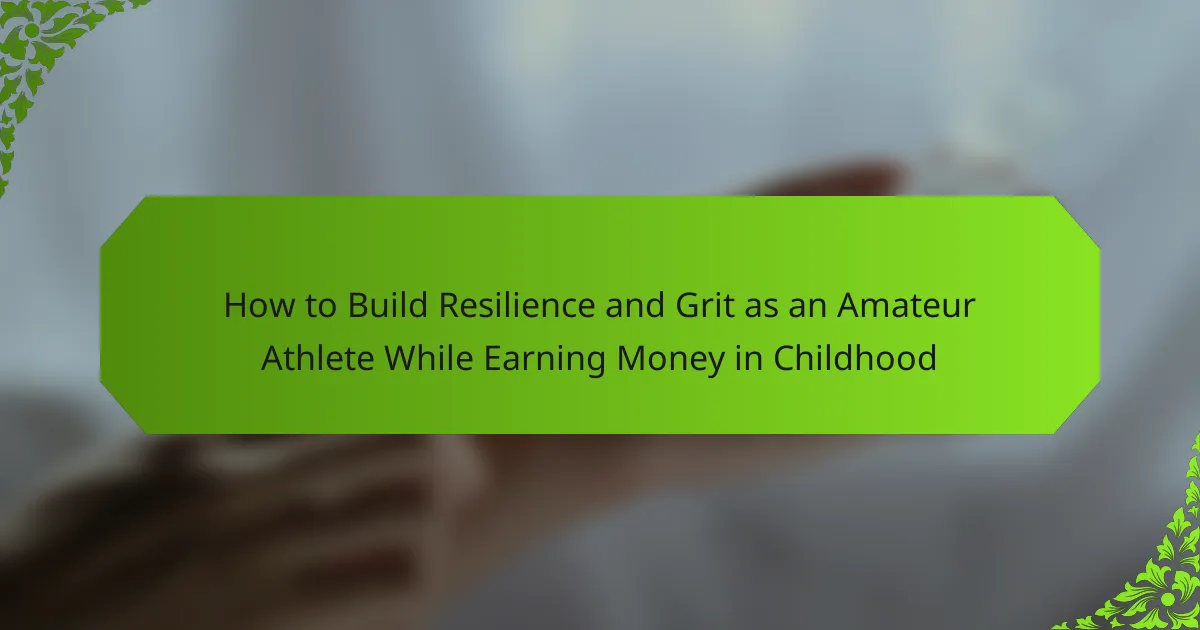Cultivating resilience and grit is essential for amateur female athletes facing challenges in their sports journey. This article explores effective strategies such as goal-setting, positive self-talk, visualization, mindfulness, and building support networks. Each approach enhances mental toughness and fosters perseverance, crucial for achieving athletic success.
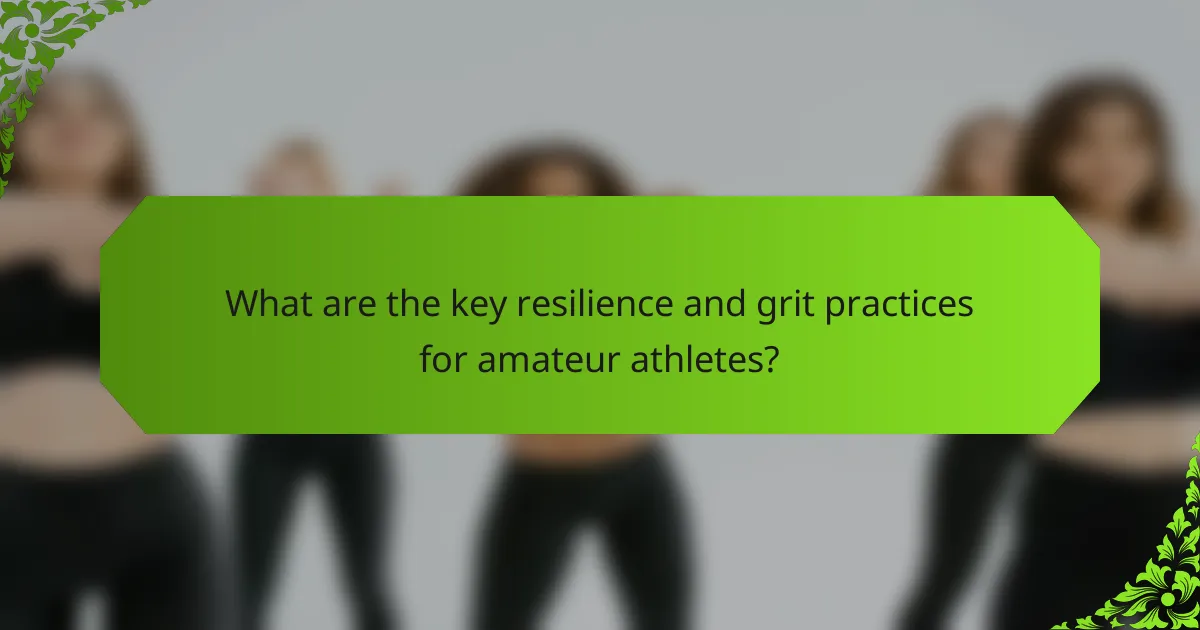
What are the key resilience and grit practices for amateur athletes?
Amateur athletes can cultivate resilience and grit through practices like goal-setting, positive self-talk, and visualization. These strategies enhance mental toughness and perseverance, essential for overcoming challenges.
1. Goal-setting: Define clear, achievable short-term and long-term goals to maintain focus and motivation.
2. Positive self-talk: Replace negative thoughts with affirmations to boost confidence and reduce anxiety.
3. Visualization: Imagine success in competitions to enhance performance and build mental resilience.
4. Mindfulness: Practice mindfulness techniques to stay present and manage stress effectively.
5. Support networks: Engage with coaches and peers for encouragement and accountability.
How do self-help books empower women athletes in building resilience?
Self-help books empower women athletes by providing strategies to cultivate resilience and grit. These resources offer practical techniques for overcoming challenges, fostering a growth mindset, and enhancing mental toughness. By sharing stories of successful female athletes, these books inspire readers to persevere through adversity. They emphasize the importance of self-belief, goal-setting, and positive self-talk, which are crucial for building resilience. Additionally, many books include exercises and reflections that help athletes develop coping mechanisms, ultimately promoting long-term success in their sports endeavors.
What are the common themes in self-help literature for cultivating grit?
Self-help literature for cultivating grit often emphasizes perseverance, self-discipline, and a growth mindset. Common themes include the importance of setting clear goals, embracing challenges, and learning from failure. Many books highlight personal stories of overcoming adversity, showcasing resilience as a key component of grit. Additionally, practical strategies such as mindfulness and self-reflection are frequently discussed to enhance emotional strength.
Which authors are recognized for their impactful work in this niche?
Several authors are recognized for their impactful work in self-help books for women focused on resilience and grit in amateur athletes. Notable figures include Brené Brown, whose research on vulnerability and courage inspires many; Angela Duckworth, known for her book “Grit,” which emphasizes perseverance; and Tara Mohr, who addresses women’s confidence in “Playing Big.” Each author provides unique insights that empower women to cultivate resilience in their athletic journeys.
What universal strategies can all amateur athletes adopt for resilience?
Amateur athletes can adopt universal strategies for resilience by embracing a growth mindset, setting clear goals, and practicing self-compassion. These strategies enhance mental toughness and promote perseverance in training and competition.
1. Embrace a growth mindset: Understand that skills and abilities can be developed through dedication and hard work. This perspective fosters resilience and a love for learning.
2. Set clear and achievable goals: Break down larger objectives into smaller, manageable tasks. This approach helps maintain motivation and provides a sense of accomplishment.
3. Practice self-compassion: Acknowledge setbacks without harsh self-criticism. Treating oneself with kindness during challenges fosters resilience and encourages a positive attitude.
4. Build a supportive network: Surrounding oneself with encouraging friends, family, or mentors can provide emotional support and constructive feedback, reinforcing resilience.
5. Develop coping strategies: Identify techniques such as mindfulness or visualization to manage stress and maintain focus during difficult times.
How can goal-setting enhance resilience in athletic training?
Goal-setting enhances resilience in athletic training by providing clear objectives and a structured path to achievement. It fosters a growth mindset, encouraging athletes to embrace challenges and learn from setbacks. This approach cultivates grit, enabling amateur athletes to persist despite obstacles. Research indicates that goal-setting can improve performance by up to 25%, highlighting its significance in developing resilience. Additionally, self-help books for women often emphasize the importance of setting realistic and attainable goals, which further reinforces mental toughness and commitment in athletic pursuits.
What role does positive self-talk play in developing grit?
Positive self-talk significantly enhances grit by fostering resilience and determination in amateur athletes. It helps individuals maintain focus and motivation during challenges. By reinforcing a positive mindset, athletes can overcome obstacles and persist despite setbacks. Research indicates that athletes who engage in positive self-talk experience improved performance and increased confidence. This unique attribute of self-talk is crucial for developing mental toughness, enabling athletes to push through difficulties and achieve their goals.
What unique challenges do women face in cultivating resilience in sports?
Women face unique challenges in cultivating resilience in sports, including societal pressures, lack of representation, and gender stereotypes. These factors can hinder their mental toughness and perseverance. Research indicates that women often encounter higher expectations to balance athletic pursuits with other roles, impacting their focus and commitment. Additionally, the scarcity of female role models in sports can limit inspiration and mentorship opportunities. Addressing these challenges through targeted self-help strategies can enhance resilience and grit in amateur female athletes.
How can female athletes overcome societal pressures to enhance grit?
Female athletes can overcome societal pressures by actively engaging with self-help books that focus on resilience and grit. These resources provide practical strategies and insights that empower women to challenge stereotypes and build mental toughness.
Research indicates that reading self-help literature can enhance self-efficacy, a unique attribute crucial for amateur athletes. For instance, books emphasizing personal narratives of overcoming adversity can inspire female athletes to cultivate a growth mindset.
Incorporating techniques from these books, such as visualization and positive affirmations, can foster a supportive internal dialogue. This approach not only boosts confidence but also reinforces the belief that societal pressures can be navigated successfully.
Ultimately, embracing the teachings of self-help literature equips female athletes with the tools to enhance grit and resilience, essential for both personal and athletic development.
What specific self-help techniques are effective for women in sports?
Self-help techniques effective for women in sports include visualization, positive self-talk, and goal-setting. These methods enhance mental resilience and performance. Visualization helps athletes mentally rehearse skills, which can improve execution under pressure. Positive self-talk cultivates a supportive inner dialogue, fostering confidence and reducing anxiety. Goal-setting provides clear objectives, motivating athletes to stay focused and track progress effectively. Integrating these techniques can significantly enhance the mental game for amateur female athletes.
What rare attributes of resilience and grit are often overlooked?
Resilience and grit often involve overlooked attributes like emotional regulation, adaptability, and intrinsic motivation. Emotional regulation helps athletes manage stress and maintain focus during challenges. Adaptability allows for quick adjustments to strategies or goals, enhancing performance. Intrinsic motivation fosters a deep personal commitment to improvement, driving sustained effort even in the absence of external rewards. These rare attributes significantly contribute to long-term success in amateur athletics.
How can vulnerability contribute to a stronger mindset in athletes?
Vulnerability can enhance an athlete’s mindset by fostering resilience and grit. Acknowledging weaknesses allows athletes to confront challenges head-on, leading to personal growth. This process cultivates emotional strength, enabling them to bounce back from setbacks more effectively. Self-help books for women often emphasize these themes, providing strategies that encourage embracing vulnerability as a pathway to empowerment. By sharing experiences, athletes can build supportive networks, further reinforcing their mental toughness.
What lesser-known practices can enhance mental toughness?
Practices like visualization, mindfulness, and positive self-talk can enhance mental toughness. Visualization helps athletes mentally rehearse scenarios, boosting confidence. Mindfulness reduces stress and improves focus, while positive self-talk fosters resilience during challenges. Incorporating these techniques into training can significantly strengthen mental fortitude.
What actionable steps can amateur athletes take today to build resilience?
Amateur athletes can build resilience by implementing daily practices. Start by setting clear, achievable goals to foster a sense of purpose. Incorporate mindfulness techniques, such as meditation or journaling, to enhance self-awareness. Engage in regular physical training that challenges limits, promoting mental toughness. Seek feedback and support from coaches or peers to cultivate a growth mindset. Lastly, read self-help books focused on resilience and grit to gain new perspectives and strategies.
What common mistakes should athletes avoid when developing grit?
Athletes should avoid several common mistakes when developing grit. First, they often underestimate the importance of consistent practice. This leads to a lack of progress and resilience. Second, many athletes focus too much on outcomes rather than the process, which can hinder their mental toughness. Third, neglecting self-care, including rest and nutrition, can diminish their ability to persevere. Lastly, surrounding themselves with negative influences can impact their motivation and grit development.
How can community support foster resilience among amateur women athletes?
Community support significantly enhances resilience among amateur women athletes by providing emotional encouragement and practical resources. This environment fosters a sense of belonging, which is crucial for mental toughness. Support groups and mentorship programs can offer shared experiences that empower athletes to overcome challenges. Research indicates that women athletes with strong community ties experience lower stress levels and increased motivation. Additionally, self-help books focused on resilience and grit can provide strategies to navigate setbacks, reinforcing the importance of community in personal development.
